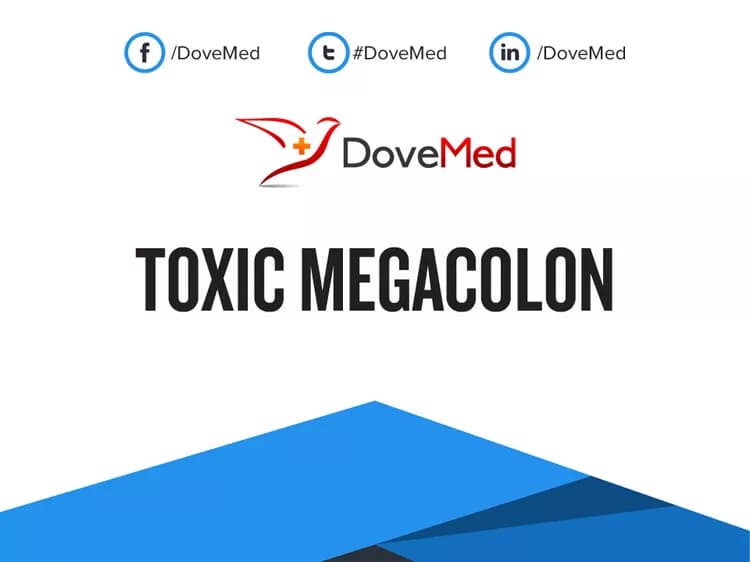What are the other Names for this Condition? (Also known as/Synonyms)
- Acute Megacolon
- Megacolon
- Megarectum
What is Toxic Megacolon? (Definition/Background Information)
- Toxic Megacolon is a life-threatening complication of other intestinal conditions such as ulcerative colitis, Crohn’s disease, or infections of the colon
- It is characterized by the rapid dilation or widening of the large intestine by more than 6 centimeters within a few days
- In contrast to other forms of megacolon, Toxic Megacolon is defined by the presence of an infection or inflammation. It is a rare, but potentially severe or fatal condition
- Treatment of Toxic Megacolon is undertaken with medications (such as corticosteroids and antibiotics), supportive therapy, and surgery, if required. The prognosis is generally good with suitable and timely treatment
Who gets Toxic Megacolon? (Age and Sex Distribution)
- Any individual with an inflammatory bowel disease (IBD), such as ulcerative colitis or Crohn’s disease, is at risk of developing Toxic Megacolon
- IBDs usually affect younger individuals (less than 30 years of age), but may also occur in older adults
- The condition is observed worldwide; all races and ethnicities are affected
What are the Risk Factors for Toxic Megacolon? (Predisposing Factors)
Individuals with the following conditions are at risk for Toxic Megacolon:
- Ulcerative colitis: An inflammatory bowel disease that typically causes inflammation of the lining of the large intestine (colon) and rectum
- Crohn’s disease: An inflammatory bowel disease that can cause inflammation of any part of the digestive tract, from the mouth to the anus
- Infections of the colon: Such infections may be caused by Clostridium difficile bacterium, which may potentially result in inflammation of the colon
Other risk factors could include individuals with:
- Diabetes
- Kidney failure
- Undergoing organ transplant
- Suppressed immunity
- Chronic obstructive pulmonary disease (COPD)
It is important to note that having a risk factor does not mean that one will get the condition. A risk factor increases ones chances of getting a condition compared to an individual without the risk factors. Some risk factors are more important than others.
Also, not having a risk factor does not mean that an individual will not get the condition. It is always important to discuss the effect of risk factors with your healthcare provider.
What are the Causes of Toxic Megacolon? (Etiology)
- Toxic Megacolon most commonly occurs as a complication of inflammatory bowel diseases (IBDs) such as ulcerative colitis or Crohn’s disease
- This potentially fatal complication occurs with an infection or inflammation. Hence, it is also known as Toxic Dilation of the Colon
What are the Signs and Symptoms of Toxic Megacolon?
Following are the signs and symptoms of Toxic Megacolon:
- Abdominal pain, tenderness in abdomen (tenderness and pain on palpating the abdomen)
- Abdominal swelling or distention
- Fever
- Rapid heart rate
- Shock
- Diarrhea
- Reduced or absent bowel sounds
How is Toxic Megacolon Diagnosed?
A diagnosis of Toxic Megacolon may include:
- Physical exam with evaluation of complete medical history
- Blood tests including complete blood count (CBC)
- Abdominal x-ray
- CT scan of the abdomen
Many clinical conditions may have similar signs and symptoms. Your healthcare provider may perform additional tests to rule out other clinical conditions to arrive at a definitive diagnosis.
What are the possible Complications of Toxic Megacolon?
Complications, such as the following, can occur if Toxic Megacolon is left untreated:
- Perforation or opening in the wall of the colon
- Bleeding
- Shock
- Sepsis (blood poisoning) or infection of the entire body
How is Toxic Megacolon Treated?
The treatment options for Toxic Megacolon include:
- Corticosteroids that aid in managing inflammation
- Antibiotics may be administered to prevent or help treat infection or sepsis (infection of the entire body)
- Administration of intravenous (IV) fluids: Fluids and electrolytes help prevent dehydration and nourish the body
- Surgery: Toxic Megacolon can lead to perforation in the colon, if left untreated. Surgery, such as a colectomy (which is the removal of the entire colon), may be needed in severe cases
- Bowel rest and decompression: Resting and decompressing the bowel removes gas or any material within the colon
How can Toxic Megacolon be Prevented?
- Treating the underlying conditions, including ulcerative colitis, Crohn’s disease, or other infections of the colon, can help prevent the occurrence of Toxic Megacolon
- Since Toxic Megacolon is a life threatening condition, individuals with IBD should be aware of this complication and immediately seek medical attention, if they develop severe abdominal pain with distention, frequent bloody diarrhea, and fever
What is the Prognosis of Toxic Megacolon? (Outcomes/Resolutions)
- Toxic Megacolon can be life-threatening if it shows no signs of improvement. In such cases, a colectomy (removal of entire colon) is typically needed
- An early diagnosis and prompt treatment of the condition, with proper management of the underlying condition such as IBD, yields a good prognosis
Additional and Relevant Useful Information for Toxic Megacolon:
- Ulcerative colitis is a type of inflammatory bowel disease affecting only the large bowel (colon and rectum). It is a chronic disease with intermittent exacerbations and symptom-free periods
The following article link will help you understand ulcerative colitis:
http://www.dovemed.com/diseases-conditions/ulcerative-colitis-uc/
Related Articles
Test Your Knowledge
Asked by users
Related Centers
Related Specialties
Related Physicians
Related Procedures
Related Resources
Join DoveHubs
and connect with fellow professionals


0 Comments
Please log in to post a comment.